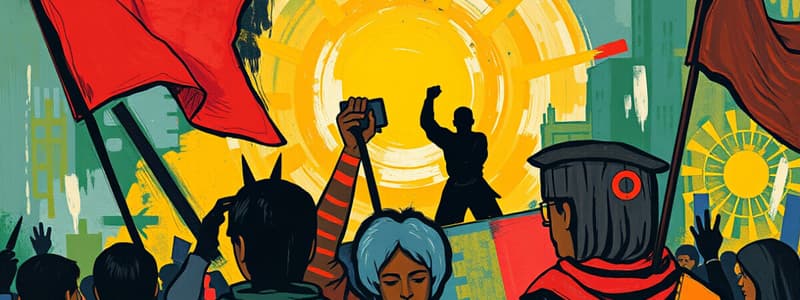Podcast
Questions and Answers
What is a key concept of civil disobedience that emphasizes the individual's obligation to resist unjust laws?
What is a key concept of civil disobedience that emphasizes the individual's obligation to resist unjust laws?
- Legal Compliance
- Government Authority
- Moral Duty (correct)
- Social Contract
Which philosopher is known for his essay 'Civil Disobedience' that promotes individual conscience?
Which philosopher is known for his essay 'Civil Disobedience' that promotes individual conscience?
- Nelson Mandela
- Henry David Thoreau (correct)
- Martin Luther King Jr.
- Mahatma Gandhi
What strategy did Gandhi develop that highlights truth and nonviolent resistance?
What strategy did Gandhi develop that highlights truth and nonviolent resistance?
- Satyagraha (correct)
- Social Contract
- Moral Obligation
- Civil Disobedience
Which event is an example of civil disobedience in the United States aimed at ending racial segregation?
Which event is an example of civil disobedience in the United States aimed at ending racial segregation?
What significant protest did Gandhi lead in 1930 against a government-imposed tax?
What significant protest did Gandhi lead in 1930 against a government-imposed tax?
What was a major global context for the emergence of civil disobedience in the 20th century?
What was a major global context for the emergence of civil disobedience in the 20th century?
Which figure used civil disobedience to resist apartheid laws in South Africa?
Which figure used civil disobedience to resist apartheid laws in South Africa?
What central theme does civil disobedience share with the idea of the social contract?
What central theme does civil disobedience share with the idea of the social contract?
Flashcards are hidden until you start studying
Study Notes
Civil Disobedience Movement
Philosophical Foundations
- Definition: Active refusal to obey certain laws or demands of a government, typically nonviolent.
- Key Concepts:
- Moral Duty: Advocates argue that individuals have a moral obligation to resist unjust laws.
- Social Contract: The idea that citizens consent to government authority but can withdraw that consent in case of injustice.
- Influence of Nonviolence: Emphasizes peaceful resistance as a means of social change.
- Philosophers:
- Henry David Thoreau: Promoted individual conscience over government laws in his essay "Civil Disobedience."
- Mahatma Gandhi: Developed the concept of "Satyagraha," emphasizing truth and nonviolent resistance.
Case Studies
- United States:
- Civil Rights Movement (1950s-1960s): Actions like sit-ins and marches led by figures like Martin Luther King Jr. aimed at ending racial segregation.
- Anti-Vietnam War Protests: Demonstrations against U.S. involvement in Vietnam, invoking civil disobedience to oppose military policy.
- India:
- Salt March (1930): Gandhi's protest against the salt tax, mobilizing mass participation in nonviolent resistance.
- South Africa:
- Anti-Apartheid Movement: Figures like Nelson Mandela engaged in civil disobedience against racial segregation laws.
Key Figures
- Henry David Thoreau: Author of "Civil Disobedience," advocating for individual resistance to government injustice.
- Mahatma Gandhi: Leader of the Indian independence movement, pioneering nonviolent protest.
- Martin Luther King Jr.: Civil rights leader who emphasized nonviolent resistance to combat racial injustice.
- Nelson Mandela: Anti-apartheid revolutionary who used civil disobedience to fight against racial oppression in South Africa.
Historical Context
- 19th Century: Emergence of civil disobedience as a formal concept; Thoreau's writings during the abolitionist movement.
- 20th Century: Heightened global movements for civil rights and decolonization; key events include the American Civil Rights Movement and India's struggle for independence.
- Modern Era: Ongoing use of civil disobedience in various social justice movements, including environmental activism and LGBTQ+ rights.
Philosophical Foundations
- Active refusal to obey certain laws or government demands, primarily through nonviolent means.
- Moral obligation to resist unjust laws highlighted by advocates of civil disobedience.
- Social contract theory: citizens consent to government authority but can withdraw consent in cases of injustice.
- Peaceful resistance emphasized as an effective strategy for social change.
- Henry David Thoreau argued for individual conscience over governmental laws in "Civil Disobedience."
- Mahatma Gandhi's concept of "Satyagraha" centers on truth and nonviolent resistance.
Case Studies
- United States:
- Civil Rights Movement (1950s-1960s) featured nonviolent actions like sit-ins and marches led by Martin Luther King Jr. to combat racial segregation.
- Anti-Vietnam War protests manifested civil disobedience against U.S. military involvement.
- India:
- Gandhi's Salt March in 1930 protested the salt tax, rallying mass participation in nonviolent resistance.
- South Africa:
- The Anti-Apartheid Movement saw leaders like Nelson Mandela engaging in civil disobedience against oppressive racial segregation laws.
Key Figures
- Henry David Thoreau: Wrote "Civil Disobedience," advocating for individual resistance to government wrongdoing.
- Mahatma Gandhi: Led the Indian independence movement, pioneering strategies of nonviolent protest.
- Martin Luther King Jr.: Prominent civil rights leader who promoted nonviolent resistance to address racial injustice.
- Nelson Mandela: Anti-apartheid revolutionary known for using civil disobedience in the fight against racial oppression in South Africa.
Historical Context
- 19th Century: Civil disobedience emerged as a formal concept; Thoreau's writings contributed to the abolitionist movement.
- 20th Century: Marked by global civil rights and decolonization movements, including the American Civil Rights Movement and India's independence struggle.
- Modern Era: Civil disobedience continues to play a vital role in contemporary social justice movements, such as environmental activism and LGBTQ+ rights.
Studying That Suits You
Use AI to generate personalized quizzes and flashcards to suit your learning preferences.




